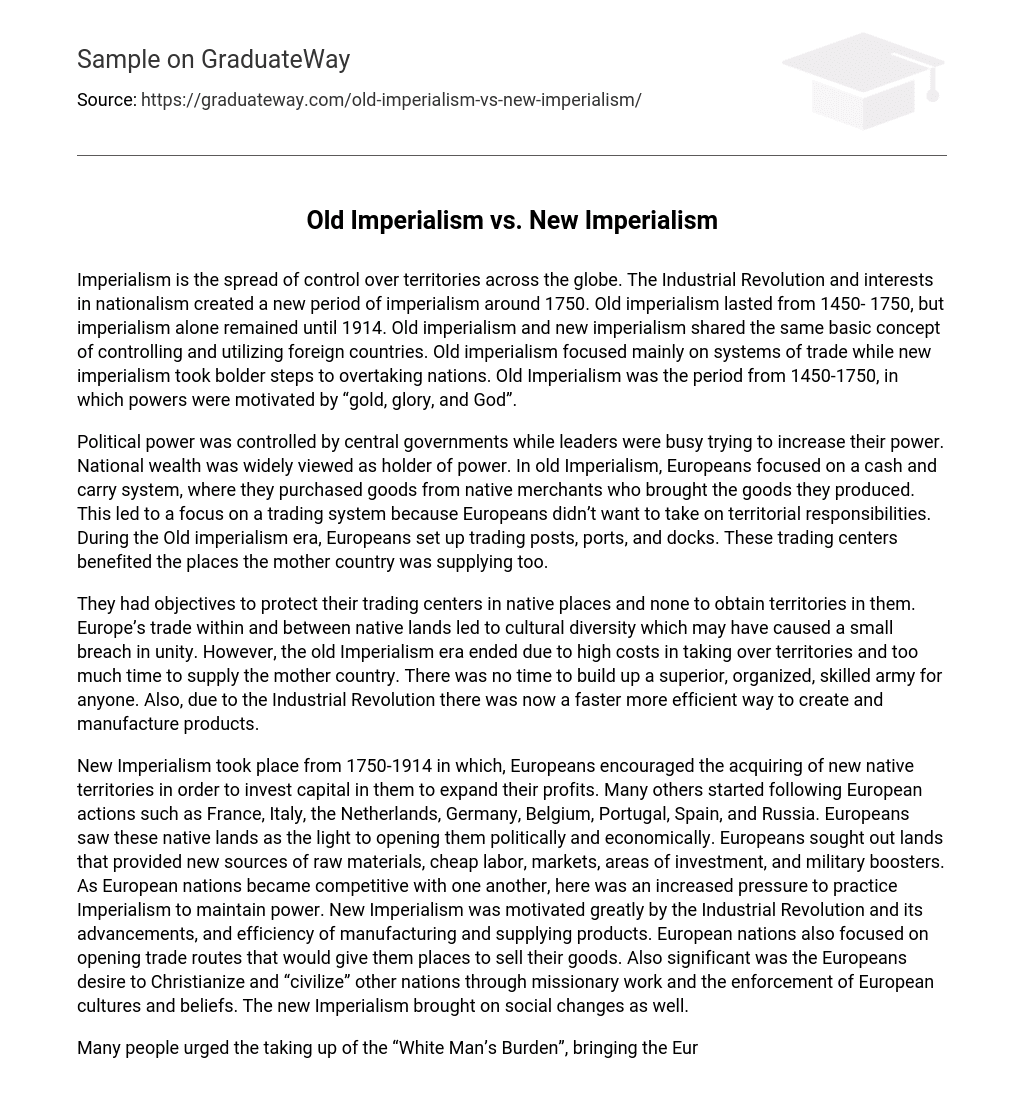Imperialism is the expansion of dominion over territories worldwide. The Industrial Revolution and interests in nationalism sparked a fresh era of imperialism around 1750. Although old imperialism persisted from 1450-1750, imperialism itself continued until 1914. Both old and new imperialism shared the fundamental idea of governing and exploiting foreign nations. Old imperialism primarily centered on trade systems, whereas new imperialism ventured further by subjugating entire countries. The period of old imperialism, spanning from 1450-1750, was driven by desires for “gold, glory, and God”.
During the era of old Imperialism, central governments controlled political power and leaders were primarily concerned with increasing their own authority. National wealth was seen as a source of power. European nations adopted a cash and carry system in their colonial activities, purchasing goods from native merchants who produced them. This approach allowed the Europeans to focus on trade without taking on territorial responsibilities. Consequently, European powers established trading posts, ports, and docks during this period, which benefitted the regions that were being supplied by the mother country.
The main objectives of Europeans in relation to their trading centers in native lands were protection rather than territorial acquisition. The trade conducted within and between these native lands resulted in a diverse range of cultures, which may have caused some slight disruption to unity. However, the era of old Imperialism came to an end due to the exorbitant costs associated with conquering territories and the lengthy process of supplying the mother country. Additionally, there was insufficient time to establish a superior, organized, and skilled army for any nation. Furthermore, the Industrial Revolution brought about a faster and more efficient means of product creation and manufacturing.
During the period from 1750 to 1914, New Imperialism occurred, with Europeans encouraging the acquisition of new native territories. This was done in order to invest capital in these territories and expand their profits. Other countries like France, Italy, the Netherlands, Germany, Belgium, Portugal, Spain, and Russia began to follow the European lead. Europeans viewed these native lands as a means to achieve political and economic growth. They sought out lands that could provide them with new sources of raw materials, cheap labor, markets, investment opportunities, and military advantages. The competitive nature between European nations increased the pressure to practice Imperialism in order to maintain power. The Industrial Revolution and its advancements played a significant role in motivating New Imperialism, as it revolutionized manufacturing and the supply of goods. Furthermore, European nations focused on establishing trade routes that could serve as markets for their goods. Another important factor was the Europeans’ desire to Christianize and “civilize” other nations through missionary work and the imposition of European cultures and beliefs. The advent of New Imperialism also led to social changes.
Regardless of whether the rest of the world desired it or not, numerous individuals advocated for accepting the “White Man’s Burden” and imposing European civilization upon them. Although there are notable differences between old Imperialism and new Imperialism, they do share certain concepts. Both eras were characterized by a strong emphasis on enhancing their nation’s power, superiority, and advancement through political, economic, and military strategies. Furthermore, both forms of Imperialism resulted in conflict, animosity, and intense competition on a global scale.
They introduced ethnic and cultural diversity globally, which had a profound impact on economies. This resulted in intense competition that could potentially trigger major conflicts, possibly two world wars. Imperialism denotes the expansion of colonial power worldwide. As multiple nations started vying for dominance, it created a new arena for warfare. Consequently, alliances, adversaries, triumphs, losses, and numerous casualties emerged. Ultimately, this drive for expansion led to the outbreak of World War I, eventually culminating in World War II and widespread economic downturns.





